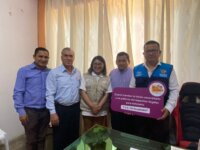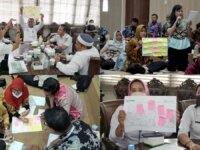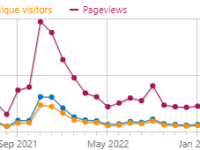Public services play a crucial role in shaping citizens’ experience of society. This handbook is aimed at professionals working in public services and focuses on concrete pratices to strengthen trust and democracy in everyday service encounters. It helps to make public services more effective by initiating and maintain trust, enhancing participation and agency, and through them delivering better learning, better safety, and better welfare.
Case Study Library
Where innovations are collected and shared to disseminate and replicate good ideas

Innovations:
0
This website, as well as any data and map included herein, are without prejudice to the status of or sovereignty over any territory, to the delimitation of international frontiers and boundaries and to the name of any territory, city or area.
Case Study
Everyday Safety and Convenience through Cutting-Edge Technology: Seongdong’s Smart Shelter &…

Smart shelter
Seongdong District’s smart shelter applies smart technologies to the bus stop to provide not only real-time traffic information but also 18 useful services, including public Wi-Fi and phone charging.
Smart crosswalk
Seongdong District’s smart crosswalk uses cutting-edge technologies (in-ground traffic light, pedestrian traffic light, voice guidance, etc.) to prevent accidents caused by pedestrians using smart phones while walking and protect children and seniors.
Case Study
Unlocking Labour Markets: Removing Bureaucratic Barriers to Enhance Opportunities for the Young…

In 2022, INDECOPI identified that 23 universities and 10 professional associations were imposing +700 bureaucratic barriers, affecting the employment insertion of +36 thousand new professionals.
Given this, the Voluntary Elimination of Bureaucratic Barriers Programme was implemented to open regulated professional services at the subnational level.
Based on behavioral tools, INDECOPI engaged with universities and professional associations to eliminate 786 bureaucratic barriers in 17 regions.
Case Study
High Impact Service Provider Case Study: Innovating the Individual Assistance Program For Survivors…
The Federal Emergency Management Agency (FEMA), a component of the United States’ Federal Government, has fully reimagined its DisasterAssistance.gov website to make applying for disaster assistance faster than ever. This change will reduce time burdens for survivors post-disaster, when they are in greatest need and the most overwhelmed. This effort has been built on decades of feedback from disaster survivors and is expected to reduce the registration time by more than 15%.
Gov.gr has boosted the number of digital systems and services in Greece and dramatically increased the number of their users (>70% of the population). In this direction, HowTo has been designed to deliver simple, online micro-courses, that guide citizens and public servants in the use of the new systems and services. HowTo supports continuous training for new features and capabilities and certification where needed. Its communities foster collaboration and peer-to-peer problem-solving.
13 Fellows from 10 different African countries in 8 institutions of the African Union to build a culture of digital innovation: the AU Digital and Innovation Fellowship is the first supranational initiative to make administrative processes in the African Union more user-centred and effective. The challenge: 12 months to integrate innovation into the African Unions processes and products. The results: 11 products in diverse AU institutions and units. And that is just the start!
Case Study
Thematic Innovation Clinic to improve the quality and quantity of public service innovations

Thematic Innovation Clinic was implemented to encourage and increase number and quality of innovations in Pontianak City. This program succeeded in increasing the number of innovations within the Pontianak City Government to 165 innovations in 2022, and to 196 innovations in 2023. With a design thinking approach, the innovation clinic increases the number of innovations, fosters the spirit and culture of innovation, and cross-party collaboration to deliver optimal public services to community.
The Government of Canada is experimenting writing existing laws and proposed regulations into code. Encoding rules allows us to run legal simulations in the regulatory drafting room, which helps us detect ambiguities, loopholes, and gaps in the rules that often go unnoticed. However, existing tools designed by and for programmers are not intuitive for rule-makers. In response, we set out to develop one – an open-source Rules as Code tool called Blawx.
India has several small cities lacking resources which has prevented them from offering digital services. To reduce the digital divide amongst the towns and cities and to ensure availability of digital services across the urban landscape of the country, NUDM attempts to offer a free, ready-made, and open-source software platform to cities and/or collectives (states). This platform is a choice-based model that benefits cities of varied maturity levels and preserves their existing investments.
Case Study
Development and Operation of the 「Korea Voice Analysis Model (K-VoM) for Voice Phishing」,…
Monetary damage from voice phishing crime in Korea stands at 3 trillion won(US$2.24 billion) over the last five years, causing massive pain to citizens. The Ministry of the Interior and Safety (MOIS) developed the first ever voice analysis model that could precisely filter out criminal voices, track down individuals involved in voice phishing crime, and form criminal clusters. This technology sped up voice phishing crime investigations and is in turn leading to reduced damage for citizens.

